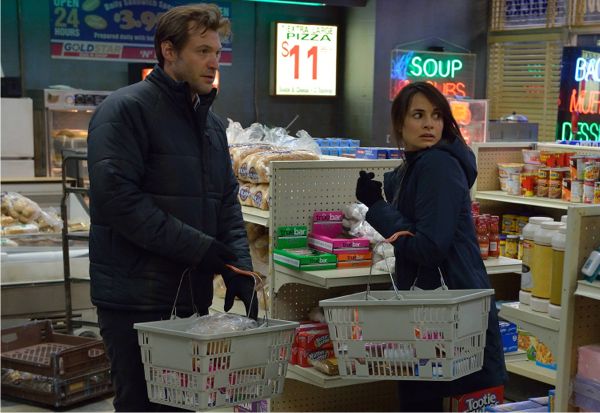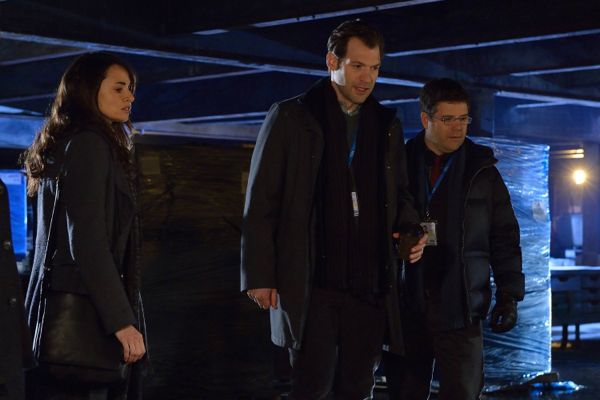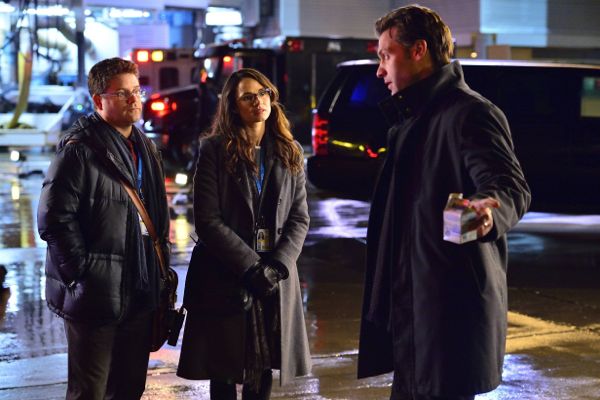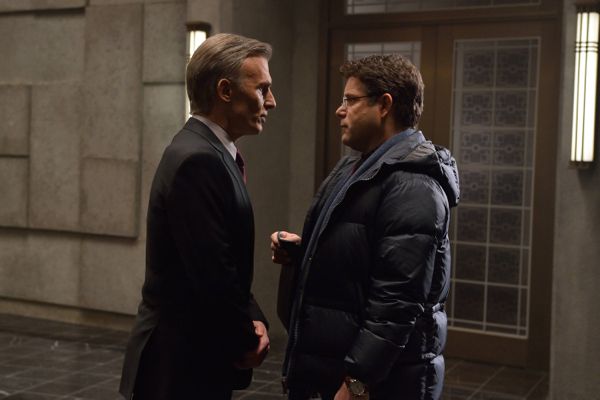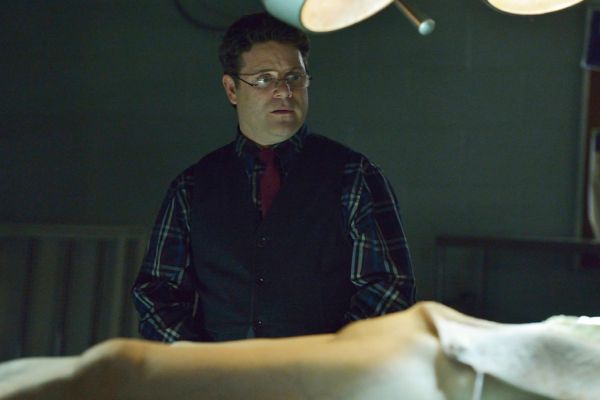The Strain's Sean Astin Interview On His Small Screen Death
- Details
- Category: Interviews
- Created: Sunday, 14 September 2014 23:04
- Published: Monday, 15 September 2014 08:21
- Written by Lupe R Haas
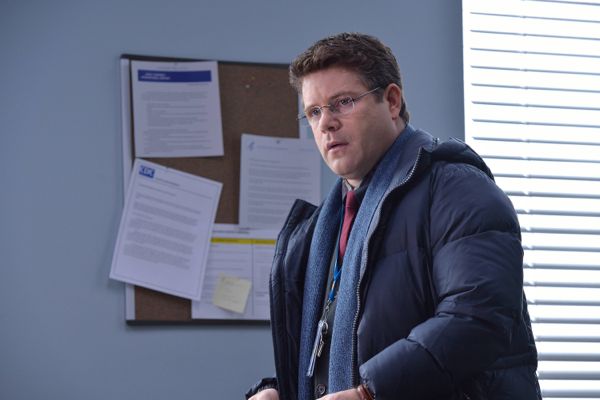
Just when storylines involving vampires appeared to run their course - the FX series "The Strain" debuted and breathed new life into them. Set in a world helmed by Guillermo del Toro and showrunner Carlton Cuse, the show illustrate the outbreak of a vampiric disease that threatens humanity.
Among those battling the virus is Jim Kent (Sean Astin), a CDC worker so desperate to save his terminally ill wife that he coordinates a risky deal with vampires. Shockingly, and much to the dismay of fans, Jim himself becomes infected and is executed out of fear that he poses a threat to those around him.
During a conference call for the supernatural hit, Astin discussed the demise of his character, bidding the series goodbye and projects he'd like to tackle next.
Q: The “convenience store” episode is so memorable. Can you talk about the challenges of filming that?
Ironically the biggest challenge of it was how cold it was. Toronto suffered really the coldest winter in most of the crew members’ memory and it’s one thing to sit here in a 75º day in Los Angeles and talk about cold weather, but it was bitter cold. So you look outside at these vampires who were in their post mortem makeup and you just figured that it wasn’t too far off from where they’re going to be if they had to stand outside any longer. But the emotions of it, I was told in my very first meeting with Guillermo and Carlton that this character from the books, who didn’t last that long in the books, wasn’t going to last very long in the series, so they invited me to be a part of this show knowing full well that in episode eight my character is going to get killed off. So there is a little bit of the gallows anticipation that comes knowing we’re in episode five; it’s only a few episodes away now before I get to say good-bye to all my new friends.
And then when you find yourself actually in the convenience store doing the work, there is an emotional responsibility that you have to the relationship between the characters. And so blocking the scene where Eph and Nora discover that he’s been fully infected, it was really kind of cool the first bit where they use the UV ray to see the worm in my face and they go and lay me down and do this sort of butcher surgery or field dressing surgery, that was all kind of cool and relatively straight forward, relatively easy.
But then when we got into blocking, Jim discovers that it’s all through my back and then I realize that the only thing to do is for them to kill me and I’m saying I don’t want to turn out like the rest of them and I don’t want go after my parents and asking Setrakian to basically explain what that is with these vampires go to the ones closest to them. It was pretty powerful emotionally and everybody had this feeling that it was exciting to be doing maybe one of the first big deaths of the show. I guess there had been others, but for me it was the big death because it was me.
And this dual feeling that the show—the characters move on and the show moves on and that was definitely a dynamic, unlike 24 where I never knew from one week to the next what was going to happen and I open the script or sitting in the makeup bus for episode whatever it was 13 and my character has this spectacular Sentox nerve gas death. So you’re like it’s sort of shocking, but you know anything can happen on that show and that is a very heroic death.
This one, Jim’s redemption is kind of petty redemption. He’s—I think the first one to plug in the UV ray lights and is what I think is a kind of for me it’s iconic where I come out of the convenience store and I’m the first one to extend my arm with the thing and burn one of the vamps with this UV light; and then of course everybody does it because Jim did it. But that feeling is yes, I don’t know; it was cool. I was at Disneyland with my wife and kids. I had run a marathon, this Disney half marathon weekend, so we did a 10K on Tuesday and a half marathon.
So I’m walking around and my legs are sore and the kids are having a ball and I realized the episode is airing right now. I hadn’t really been paying any attention to my phone for three days, but we’re sitting on the train going through Fantasy Land and I’m looking at seeing all these messages saying all right, Jim, we’re going to miss you buddy. It was a sad way for you to have to go, Jim, but we tried to have fun with it. What are you going to do?
Q: You said that you were 16 and you were working in a movie theatre because back then you had already been a successful actor. How did you end up then working in a movie theatre and what’s it like to be a guy who’s an actor working in a movie theatre watching other people act?
It’s funny I was looking online right before I got on the conference call and there was this article about celebrities who live below their means or something, modest celebrities; and it talked about how Leonardo DiCaprio occasionally takes a commercial flight. When I was 16 my mom and I, I had a car for a little bit and then she wanted or needed the car back, so I basically was doing summer school and night school. I really wanted to graduate with a better GPA than I had earned throughout the rest of my high school year and I would take the bus into Westwood from my dad’s place in west LA. I just worked in a movie theatre. I worked at the Bruin and Mr. Francis was my manager. I started by taking tickets at the door.
The fun story I have is with my buddy Corey. It was his movie. It was the first I guess I worked a couple of days on, it was like the end of Superman’s run. I can’t remember what it was, but anyhow and then it comes in and there’s the big premiere and Corey walks in and I’m wearing my blue blazer with my gray pants and my name tag. I used my middle name and Patrick is my middle name. I used my middle name and all the actors are standing by the concession stand and Mr. Francis, who is I don’t know 147 at that point he’s since passed away and he’s just a known guy; he’s a known figure—character personality and he said “Sean, you got to go pick up that popcorn.” I grabbed the broom and dust pan and I walked over. I was like “Excuse me, Corey,” and he looked and he saw me and he’s like, “Sean, what happened?”
I worked my way up through the ranks. It took all summer, but by the end of it, I was making bank drops from the box office and I cleaned the butter maker and it was fun. I remember my mom sort of being shocked that I would do that job, but I liked it. And that couple hundred buck check meant more to me than the $10,000 check that I got when I was eight because that $10,000 check went into an account that I didn’t see till I was 18 and now I was 16 and I could go spend that money. I don’t know. I count that as one of the good experiences for me.
Q: What was it about Jim for you as an actor that really made you want to invest in that role?
Guillermo wanted me to do it, so I wanted to do it. And then the idea for me was figure out what it was that he saw in me that he wanted me to do it. I think you could take a wide range of actors and put them in that part and it would be a Rorschach test of who that actor is. I think what he liked is that as Samwise Gamgee I’m known for being a friend and loyal and likable, a nice guy; and I think he liked the juxtaposition of somebody doing something morally questionable or wrong, who is likeable at the same time that it would make—like you said it’ll be interesting for people to have to wrestle themselves with it.
So, what I came to like about Jim, was the way that he wanted even though he did the wrong thing, he really wanted to be of service as a CDC guy, as an aide to Eph. He wanted to help and so I liked leaning into that. Then during the autopsy scene and during this scene in the eighth episode and a few other times, something will happen and he just sort of says what everyone else is thinking in a basic way. I think that made him even more entertaining in moments for folks.
Q: You mentioned Guillermo del Toro approached you to play the role of Jim Kent, how exactly did he approach you?
I had a meeting with Guillermo and Carlton at WB when he was finishing Pacific Rim. Traditional meeting. He thought of me for the part, or I was on a casting list, regardless, he and Carlton brought me in
Q: I wanted to know, what is one of your most fun experiences coming from the set and one of your funniest memories? Because the show is dark, how do you guys keep it light?
First there are lots of things that come to mind, but I always hit this. People don’t seem to remember, they don’t seem to talk about it very much. It was really, really, really cold. It’s a vampire show. Vampires you’re not supposed to be able to see their breath. It was a challenge I think for the effects people to do it how cold it was when there’s outdoor stuff and the vampires. But no, there was a moment where Corey came in on his phone playing this video game, the fighter pilot video game, so I downloaded it and the two of us with our phones or iPad mini’s in between dissecting vampires and bludgeoning the turned captain in the head with a fire extinguisher we were competing, frankly I was no match. Even over the holiday break when I had some time to practice, I showed back up and Corey was just an absolute, he absolutely dominated the game, so that was one fun thing.
And then frankly it was fun coming to work and seeing the different things that they had put together. I keep going back to the autopsy because I don’t think anything like it has ever been shown on television, a vampire autopsy. And they spent so much—it was such an expensive and intricate, I don’t know, was it a prop or special effect. We’ve been working with this actor and now we were dealing with his absolutely lifelike like corpse. It was really disturbing.
Q: I went through my initial stages of grief after watching the episode this past Sunday. I went back and rewatched, and one of the things I noticed was that Setrakian I don’t think severed Jim’s head. Now I don’t know how the disease works, but the question is are you quote “maybe alive”? Will we possibly have an opportunity to see a vamped out Jim or was that actually the end, period?
I’m pretty sure that Fet killed Jim properly. He established, I think even in that episode, Setrakian reestablished that severing the head is one thing or injuring his—he goes into some description about how hitting certain bone things can hurt them this way and that way, but I think they’ve gone outside and shot them a lot. Eph and Nora are each shooting guns and killing them and Nora says he’s still coming and it’s like you got to shoot them in the head, so I don’t know how many times he pulled the trigger, but it felt like at least four or five at point blank range. I think Jim, I’m sorry to relate that Jim is—I appreciate the mourning. I feel close to Jim. My favorite thing was people with the hash tag RIPJIM. I kind of wanted to get that blown up and put that on the office wall.
Q: So you talked about your last scene and everything, but I was curious, how did they do the sort of special effects with the worms and everything? Was it all digital, or was some of it practical?
It was all digital. Basically they would put little orange dots, reference dots, all over the area where the worm would be, but you know what that is totally unfair what I just said. Scrap that. The actual prosthetic of the cut on my—I was immediately thinking of the worm effect, because that was the closest to me because I just saw it the other day for the first time. But no, they had a brilliant piece that they put on my cheek that they could sew and un-sew and it was really, really good. People really responded to it on the set and I liked working with it, so it didn’t take very long to put on at all. It was a piece that started at the top of my inner eye at the bridge of my nose and went down right under the eye all the way around the eye basically kind of like in a half moon and then up into the hairline and down around the jaw and kind of underneath the jaw on the top of the neck and then up and around the same side of the mouth. So it almost looked like the Phantom of the Opera’s mask sort of like a miniature version of that or that with a convertible version of the Phantom of the Opera mask.
And then they painted it beautifully and then they added the—it was really cool was they pull the thread through it because if you’ve ever had stitches, I’ve had lots of stitches in my life and it felt the same. When they numb you, they put a long needle in and they numb the area that they’re going to give you a stitch, you can still feel it, but it doesn’t hurt and that’s exactly what it felt like when they’re threading the cut on Jim’s face. The actual worms, though, were orange dots.
Q: Since you did have some fair warning of your character’s demise, have you had an opportunity to look around [find] what you’re going to do next? It sounds like you’re not looking for a franchise, but looking for something unique like this was. So what’s coming up on your agenda?
I’m sort of the opposite. When a franchise, a really good one, comes along, it’s great to be included. Actually I meant the opposite of that, so I play the voice of Raphael in the Nickelodeon Teenage Mutant Ninja Turtle franchise and I’m one of the many Raphael’s that there have been, so I kind of like that. Maybe I’m kind of a joiner, I don’t know.
The one thing I would say for everybody is that I knew that I was going to die, but I didn’t know how and when I got the script for it, which was only a few weeks I think beforehand, I loved it. Before that I had been a little bit kind of sullen over the fact that I was just getting to know everybody and enjoy everything and I knew I wasn’t going to be around very long. But when I saw how cool the episode was with this kind of “Butch and Sundance” battle royale out of a convenience store and then like the way that it was discovered on me and how the relationship is resolved and stuff, I absolutely felt like you couldn’t have asked for a better send-off. I was pretty happy with that.
I have an independent film that’s coming up called The Surface with me and Chris Mulkey. It’s a two-hander kind of a meditation on hopelessness and suicide, so there’s that. And then I also have a little animated film that I guess is being released independently called Ribbit about a poisonous tree frog, who believes he’s destined for something more than the life of a poisonous tree frog, so I play Ribbit. That’s coming out I think in September. I don’t know if it’s in wide release or not, but it’s on my radar.
And then I don’t know, I’ve been getting offered lots of fun things in the Sci-fi horror realm, which I haven’t grown too tired of yet, so as long as there’s something to play, I’m willing to keep thinking about that. And then I don’t know, looking for the next thing and the next thing to get excited about.
Q: Tell [me] about the trek through Guillermo del Toro’s mind. We’ve seen him from Pan’s Labyrinth and Hell Boy and everything else that he’s done. And to work with him that closely, there has to be some insight that you gathered to take that little stroll in his mind’s eye.
Now everybody expects something huge from Guillermo every time he opens the door, so I guess what really impressed me about him is that he continues to deliver in the face of overwhelming expectations and he does it in a way that is calm and fun. He just seemed—I’m not sure if it’s because he lived with this book for the years that he’s lived with it and wanting to make the show the way he’s wanted to make it and then getting to make it the way he wanted to make it, or if this is just the way he is everywhere he goes. But he was just happy, just a happy guy and when it came to giving direction, he was very specific, very detailed. If you had a question, he would relish in being able to elaborate on an answer as though this was the most fun part of the process.
And then you’d see him off to the side having a conversation with a digital effects supervisor about what the movement of the worm was supposed to look like and he would be in this enthralled state of bliss envisioning, making the fantasy of these worms in his mind “real” in the digital space. I guess he both loves the fantastic and the real and so and those things serve each other. Those interests serve each other, so it was fun. Yes, you’re right, it was really a privilege to interact with him.
Q: Have you ever taken a look at The Strain comics and also you’re working with Feldman on Ninja Turtles, where he’s voicing Spike, correct?
Yes. I have seen the comic books. I haven’t read them all, but I think I understood a little of the story a little bit better when I glanced at the comic book the first time. I think I thought I get it now and that’s what that’s supposed to be, but somehow that seemed different. I listened to Ron Perlman read the audio books. That’s how I experienced The Strain the first time. I was riding my fancy bike in the middle of the night. I was in training and I would ride my bike all over the San Fernando Valley, which made me think of Tom Petty’s song about the vampire standing in the shadows freefalling. So the imagery, the ideas, the vocabulary for it was very richly drawn, beautifully performed by Ron Perlman; but when I saw the comic books, it seemed to me like somebody’s interpretation of it not like it was coming from the thing. I don’t know if that’s right or wrong; that’s just the way I came at it.
And yes, Feldman plays Spike. It’s fun to have my buddy Corey be my little turtle who then turns into a monster. It’s pretty fun because obviously he was around in the original time of that franchise, seems to be the word for the interview here, but yes, it’s pretty cool.
Q: A lot of actors lean on personal experiences and engrained emotions to bring their characters to life in a believable fashion. Is there any part of Jim Kent that makes you say “I can totally relate to that; let me use my own familiarity to generate a real sense of authenticity.”?
I’m probably more like Jim Kent than I am Samwise Gamgee in as much as I have to make choices in my life that I’m not an ideal literary character because people always want to know if I was like Sam and I try and embody some of those traits that Samwise has, but for Jim, I guess my technique relies on trying to feel the emotions or the moments as the character would feel it in real time. That’s how I get the closest to manifesting something that’s authentic.
Having said that I don’t think I can help but bring a large part of myself to it. I just try not to draw one to one correlation between something in my life that I’ve experienced and something that it would evoke of an emotion that’s the same or similar to something that Jim would be feeling at that moment. I think that my empathy quotient is high enough that when I see he’s lied on behalf of his wife who’s got cancer or he’s trying to save people by plugging in a UV ray to maybe stave off some vampires or any of those feelings I find it very easy to be empathic for those feelings. And it’s easier for me because on take three and four and five and whatever as you reinvest in it, it might be harder for me to try and transplant emotions that I’ve had in my life a second time and a third time and a fourth time. I do know a certain music that seems to be able to do things, but anyhow that’s my process.
Q: What are the things that draw you to certain roles that you accept either on TV or in film?
There are times when it’s clear that movies have been written and are getting made for reasons that are other than that are purely financial and people have figured out the formula. They figured out how to get money to make a movie. It’s really hard. I’m incredibly sympathetic to how hard it is to get things made, so there has to be an internal logic within the story. The dialogue has to be credible, but it doesn’t have to be Shakespeare for me to be willing to do it. I’m happy doing lower budget movies. I like doing big budget movies. It’s really just a question of if I’ve done a couple of really big things, things that have really scored, then I like the idea of scrounging around and finding low budget independent film where I can play a drug addict or where I can do something like that. If I’ve done a whole string of independent films that nobody has seen, then I find myself yearning to get back on the grid, so I think my career is very easy to interpret. It’s about working. I’m a working actor; that’s how I see myself.
